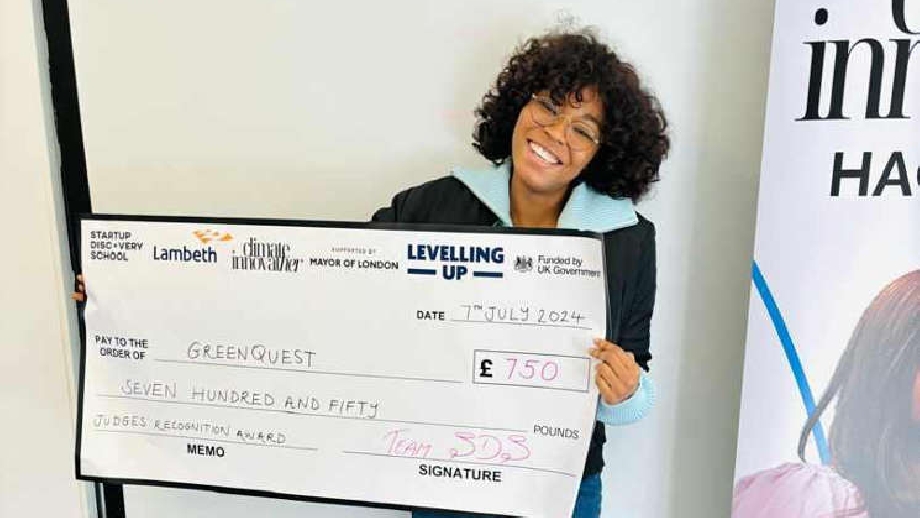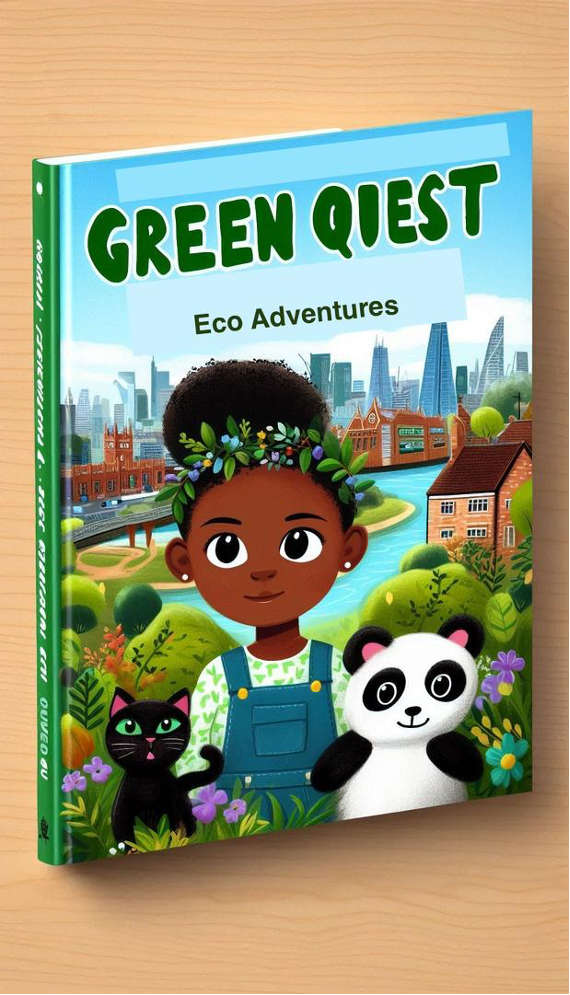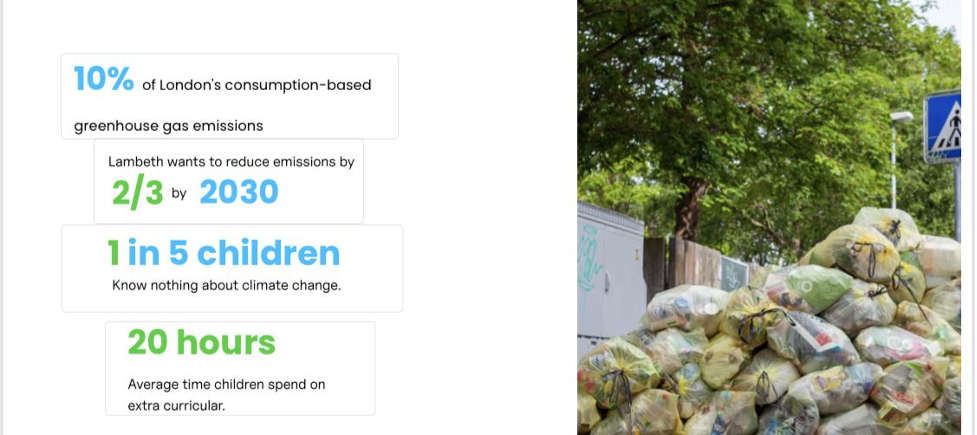
When she announced to her family for the first time that she was transitioning into technology, they were unprepared for what happened next.
Meet Obiageli Okafor, the Nigerian tech innovator in the UK currently working as a product manager, who is passionate about using technology to teach climate change to the coming generations.
She created Green Quest, an app that encourages children's environmental conservation through educational games and stories. Green Quest is aimed at local kids in the heart of London, aged 5-11 to ensure the lessons learned are rooted in their communities.
“Green Quest is an edtech platform that uses fun games and stories to teach children about waste management," Okafor says.
Over the years, climate change has brought drastic challenges to health, forcing humanitarian crises like heat waves, wildfires, flooding, and more violent tropical storms, the World Health Organisation (WHO) has stressed.
The WHO warns that between 2030 and 2050, climate change will cause around 250,000 additional deaths per year, primarily due to undernutrition, malaria, diarrhea, and heat stress. The costs are also economic, with direct expenditure on health projected to be 2 to 4 billion dollars annually by 2030.
London's Response to Climate Change
In London, the switch in the climate is changing the city in many ways, prompting the authorities to adopt various schemes and strategies to tackle its impacts. Since 2016, the city has made big progress on air pollution but there are still challenges. NO₂ and PM 2.5 levels will be above WHO guidelines by 2030, unless London does more. The most deprived communities are still seeing higher pollution levels despite the progress, according to a 2023 report on London’s climate.
In response to the climate crisis, London declared a climate emergency in 2019 focused on reducing carbon emissions by a lot to avoid severe economic, ecological, and societal harm. The declaration says London must protect the city’s economy, ecosystems, and community from the impacts of climate change, according to London’s Emergency Climate Action. Improving public transport, energy efficiency in homes, and green spaces are part of the overall strategy to mitigate climate impacts and be more sustainable, the report says.
Green Quest: Bridging the Climate Knowledge Gap
So it’s not out of place if this urgent need for comprehensive climate action allows the next generation, especially Generation Alpha, to play its part, starting with climate change education and the behavioral changes required to help curb climate change.

Inspired by the need to bridge the knowledge gap in climate change education, Okafor envisioned a tool that could educate and inspire future leaders to take early action. For a start, Okafor’s Green Quest introduces games where kids can join in, like Sort It Out, an exercise in proper waste sorting, and Green Guess, testing knowledge of eco-friendly practices via a quiz. Sort It Out is an interactive game designed to teach children about proper waste sorting. In this game, players are presented with various household items and must decide whether each item belongs in the trash, recycling, or compost bin. Green Guess challenges players with multiple-choice questions about sustainability, promoting critical thinking about everyday objects and their environmental impact.
Local Relevance and Impact
What sets Green Quest apart is its adaptability to local waste management practices and environmental challenges. This customization makes the app's lessons more relatable and impactful for young learners.

The journey to create Green Quest began with a hackathon organized by Startup Discovery School (SDS) in collaboration with Lambeth Council. "I learned about the hackathon through SDS's announcement for their inaugural event aimed at women in STEM to build climate solutions. The chance to contribute to climate action while potentially winning prizes and accessing an incubator program was incredibly appealing," Okafor recalls.
Expanding Green Quest's Reach
Green Quest’s potential extends beyond waste management, with plans to cover other sustainability issues like energy conservation and biodiversity. Despite the app’s great idea, Okafor faced many challenges during development. “Condensing my vision into a workable Minimum Viable Product (MVP) within 14 hours was the biggest challenge. I focused on core features to overcome this,” she says. For now, Green Quest has a mobile experience that lags behind some of its competitors like EcoKids and Earthrangers, higher subscription fees, and a less intuitive interface that might be a barrier for younger children.
Bringing Climate Education to Nigeria
Climate change education, especially for schoolchildren, is at its early stages in Nigeria. Many local communities remain unaware of the implications of poor waste management and what children can do if educated properly. Replicating Green Quest in Nigeria could be a big boost to environmental education.
Uche Aniche is a tech and innovation ecosystem leader who, in the last 9 years, has been hosting a tech conference in Nigeria called StartUp South. He says hackathons are not a new thing in Nigeria; however, when they come up, the outcomes usually go unreported. He is also not quite sure how often hackathons are held in Nigeria, especially those focused on climate.
"A lot is going on in the tech ecosystem in Nigeria," he continued, "but the key people who should be engaging to make hackathons happen frequently are ignorantly staying away from making them happen, either because they do not understand what is going on or deliberately they do not want to engage."
Hackathons require funding and support to happen and even though there are lots of corporate, well-funded foreign and local organizations that should be getting involved in the tech ecosystem in Nigeria, they are not engaging, Anichie explained. He said, against all these important challenges he foresees in implementing climate education programs, especially Green Quest, in many schools and communities in Nigeria, his upcoming tech conference, StartUp South 9, on October 3 and 4, 2024, will have a session on climate resilience where all the issues and possibilities will be the topic for conversation.
"We plan to invite these key organizations to join the conversation on how to do things better, as climate resilience is part of the core of climate education," Aniche says.
"Technology can be applied to produce more climate-friendly products, which can be used not just in rural areas but even in urban areas." He said, adding that while local governments do not have control over integrating climate education into the Nigerian school curriculum, they have control over waste management and can do more to improve behavioural patterns towards climate change.
"They must first expose themselves to the issues, including how the tech ecosystem can help with this." This is why Startup South 9 decided to engage the authorities at the local government level.
What it will take may be no more than a replication of Green Quest in Nigeria to cause a turn-around shift in climate education—empowering the next generation with knowledge and skills for effective combat of climate change.


